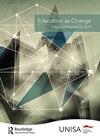土著诗歌教育学的路径映射:表现、出现和非殖民化
IF 1
4区 教育学
Q3 EDUCATION & EDUCATIONAL RESEARCH
引用次数: 5
摘要
诗歌在世界各地的高中英语课堂上是出了名的不受欢迎,南非的英语FAL(第一附加语言)课堂也不例外。我们报道了对约翰内斯堡一所乡镇学校11年级学生的一项教学干预,该校通过允许学生用任何语言和任何主题创作和表演自己的诗歌,向土著诗歌和身份开放了课堂。我们摒弃了由血统或“种族”定义的本质主义的土著性概念,认为土著身份是流动的、表演性的,不可避免地与殖民主义纠缠在一起。我们认为,土著诗歌、意义和身份是在干预创造的开放空间中涌现出来的。为了进一步探索这种出现,我们将教育学本身视为表演性的,教师和学习者之间的互动,在这种互动中建立知识,讲述故事,沉淀身份。我们关注的是从学习者的表现中可以了解到土著诗歌教学法的可能教学途径。我们确定了当课堂向土著诗歌开放时,非殖民化教育学的制约因素和潜力,以及这种非殖民化教育法的想法。研究结果表明,需要在课堂上对诗歌的伦理和政治进行新的思考,有些是所有土著教育学的通用方式,有些是南非当地赞美诗传统的特有方式。本文章由计算机程序翻译,如有差异,请以英文原文为准。
Mapping Pathways for an Indigenous Poetry Pedagogy: Performance, Emergence and Decolonisation
Poetry is notoriously unpopular in high school English classrooms all over the world, and English FAL (First Additional Language) classrooms in South Africa are no exception. We report on a pedagogical intervention with Grade 11 learners in a township school in Johannesburg, where the classroom was opened to indigenous poetry and identities by allowing learners to write and perform their own poetry in any language and on any topic. Rejecting essentialist notions of indigeneity as defined by bloodline or “race”, we work with a notion of indigenous identity as fluid and performative, and as inescapably entwined with coloniality. We argue that indigenous poetry, meanings and identities were emergent in the open space created by the intervention. To further explore this emergence, we discuss pedagogy itself as performative, an interaction between teacher and learners in which knowledge is built, stories told and identities sedimented. We focus on what can be learned about possible pedagogical pathways for an indigenous poetry pedagogy from the learners’ performances. We identify the constraints and potentialities for a decolonial pedagogy that arise when the classroom is opened to indigenous poetry, and ideas for what such a decolonial pedagogy would look like. The findings suggest that new ways of thinking about the ethics and politics of poetry in the classroom are required, some general to all indigenous pedagogies, and some specific to local South African traditions of praise poetry.
求助全文
通过发布文献求助,成功后即可免费获取论文全文。
去求助
来源期刊

Education As Change
EDUCATION & EDUCATIONAL RESEARCH-
CiteScore
1.40
自引率
0.00%
发文量
29
审稿时长
24 weeks
期刊介绍:
Education as Change is an accredited, peer reviewed scholarly online journal that publishes original articles reflecting critically on issues of equality in education and on the ways in which educational practices contribute to transformation in non-formal, formal and informal contexts. Critique, mainly understood in the tradition of critical pedagogies, is a constructive process which contributes towards a better world. Contributions from and about marginalised communities and from different knowledge traditions are encouraged. The articles could draw on any rigorous research methodology, as well as transdisciplinary approaches. Research of a very specialised or technical nature should be framed within relevant discourses. While specialised kinds of research are encouraged, authors are expected to write for a broader audience of educational researchers and practitioners without losing conceptual and theoretical depth and rigour. All sectors of education are covered in the journal. These include primary, secondary and tertiary education, adult education, worker education, educational policy and teacher education.
 求助内容:
求助内容: 应助结果提醒方式:
应助结果提醒方式:


